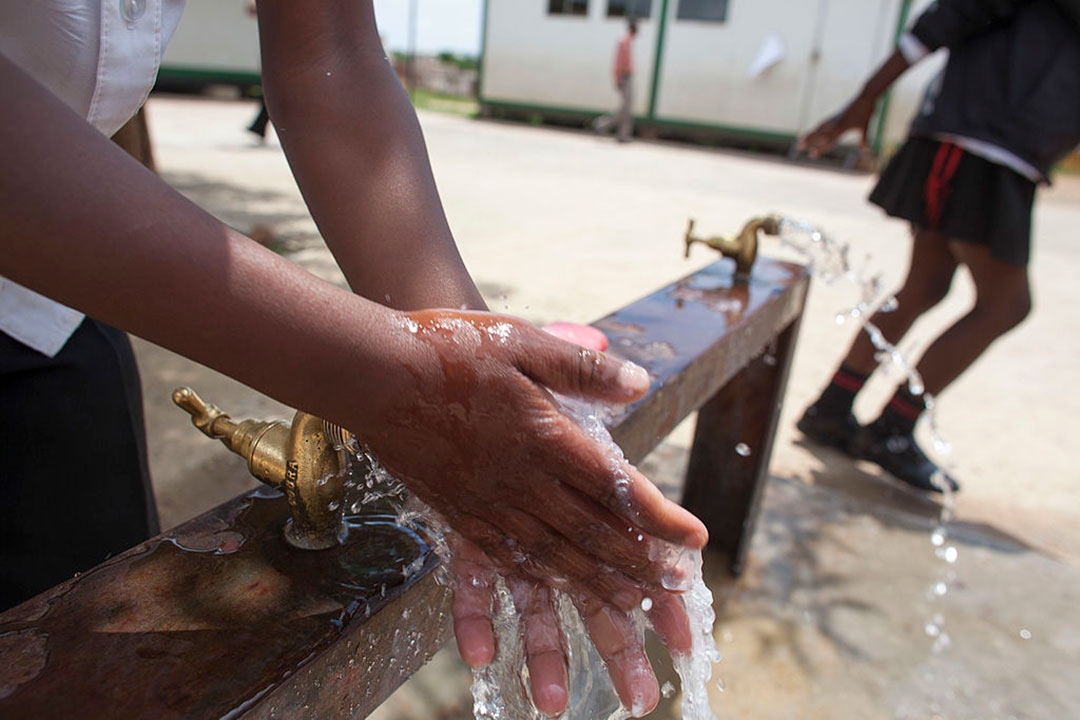South African Project Urges Pedestrians to Stop for a Scrub
ADF STAFF
In South Africa’s fight to disrupt the spread of COVID-19, the simplest weapons — soap and water — can be the most effective.
For that reason, UNICEF, with help from the United States Agency for International Development, is building 150 public hand-washing stations across the country. The program started in Alexandra township in northern Johannesburg and expanded quickly to include communities in Northern Cape, North West and KwaZulu-Natal provinces.
Overall, the South African government says, about 90% of South Africans have access to clean water, whether piped into their homes or from a nearby public tap. But the availability depends largely on where people live.
Water resources are nearly universal in Western Cape or Gauteng provinces, homes to the country’s two largest cities. But less than 75% of residents in rural Limpopo province have the same access. And within huge cities such as Johannesburg, availability can vary widely.
UNICEF is working with Envirosan and World Vision South Africa to install hand-washing stations and to communicate the importance of hand-washing in keeping people safe from COVID-19.
Dorcas Mohlasedi lives with her four children in Stjwela, Alexandra, near one of the new hand-washing stations. Before the coronavirus outbreak, about 7,000 people waited in long lines to use her community’s single public tap. The new station makes it simpler for her and her children to keep themselves clean and fend off the virus.
“It’s much better now,” she said.
The project aligns with South Africa’s ongoing program, begun in 2016, to increase hand-washing to prevent communicable diseases such as diarrhea and now COVID-19.
“Hand-washing with soap has been proven as the single most effective way to prevent … hygiene-related diseases as automatic behaviors performed in homes, schools, and communities,” Dr. Aaron Motsoaledi, then health minister (now home minister), wrote in the preface to the national hand-washing plan. “Hand-washing with soap offers the opportunity to have a real impact.”
As of August 10, South Africa has recorded more than 560,000 COVID-19 infections and more than 10,600 deaths since the virus arrived there earlier this year. It ranks among the most affected countries in the world. South Africa’s situation is complicated by a population also beset by HIV, tuberculosis and other health problems that can increase people’s risk from COVID-19.
Research shows that simple soap and water is a lethal combination for COVID-19. Chemically, soap reacts with the shell of the virus, breaking it up and then encasing the particles to be washed away by the water. Soap and water have the extra advantage of carrying away dirt and grease that may hide viruses.
Alcohol-based hand sanitizers, used properly, also break up the virus but can leave the particles on the hands.
“Coronavirus has already highlighted that safe water and sanitation is essential to protecting human life during all infectious disease outbreaks,” Inga Jacobs-Mata, the South African representative from nonprofit research group the International Water Management Institute, told Reuters.
Under the hand-washing program, UNICEF works with local municipalities and the Department of Water to identify sites in underserved communities and commit to maintaining water and soap supplies. UNICEF gets local officials to take ownership of the stations to ensure they’re protected and maintained. Under the UNICEF program, the location of each hand-washing station is provided to the Water and Sanitation Command Center (part of the national COVID-19 command center) and local municipalities decide whether to adopt the site.
“This means the municipality is then responsible to refill the hand-washing stations through water trucking,” Toby Fricker, chief of communication and partnerships for UNICEF South Africa, told ADF. “The hand-washing stations are a critical part of the emergency response to help curb the spread of COVID-19 but not an ideal long-term solution.”


Comments are closed.